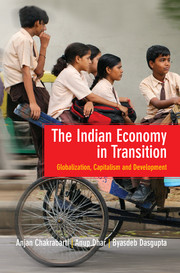Book contents
- Frontmatter
- Contents
- Preface
- Introduction
- Chapter I The Condition of the Working Class in Contemporary India
- Chapter II Capitalism: The ‘Delusive Appearance of Things’
- Chapter III Post-colonial Development and ‘The Thought of the Outside’
- Chapter IV The Word and the World of Neo-liberalism
- Chapter V The Scrypt of Transition: Between the Spectral and the Secret Thereof
- Chapter VI From Self-reliance to Neo-liberalism: The Political Economy of ‘Reform’ (1991–2014)
- Chapter VII Global Capitalism and World of the Third: The Emergent Cartography of the Indian Economy
- Chapter VIII Inclusive Development, State and Violence
- Chapter IX From Economic Crisis to Transition Crisis
- Conclusion
- Bibliography
- Author Index
- Subject Index
Conclusion
Published online by Cambridge University Press: 18 December 2015
- Frontmatter
- Contents
- Preface
- Introduction
- Chapter I The Condition of the Working Class in Contemporary India
- Chapter II Capitalism: The ‘Delusive Appearance of Things’
- Chapter III Post-colonial Development and ‘The Thought of the Outside’
- Chapter IV The Word and the World of Neo-liberalism
- Chapter V The Scrypt of Transition: Between the Spectral and the Secret Thereof
- Chapter VI From Self-reliance to Neo-liberalism: The Political Economy of ‘Reform’ (1991–2014)
- Chapter VII Global Capitalism and World of the Third: The Emergent Cartography of the Indian Economy
- Chapter VIII Inclusive Development, State and Violence
- Chapter IX From Economic Crisis to Transition Crisis
- Conclusion
- Bibliography
- Author Index
- Subject Index
Summary
Let us end the book, a book that has tried to make sense of the overdetermined and contradictory triad: neo-liberal globalization, global capitalism and inclusive development, with a somewhat larger and ambitious reflection. The reader by now must have seen that this book was about the ‘contemporary’. Or perhaps is about the contemporary; a contemporary that is ongoing; that was and is changing, as we wrote or write the book; including the fact that a new government comes to power on May 16, 2014 with its own economic framework and policy. We have also shown how ‘neo-liberalization is not (only) about “cutting off” some social welfare and/or getting less money for ones work’, how neo-liberalism ‘constitutes a completely different conceptualization of (organized) society and, along with that, new forms of subjectivity, grounded on a new – a neo-liberal – anthropology’ (Marvakis, 2012, as quoted by Dafermos, 2013). We have asked, are we ‘witnessing a Great Experiment in the making of a new neoliberal humanity through the crisis?… Will the neo-liberal model of what it is to be a human being become definitive for the next fifty years’ (Caffentzis, 2012, as quoted by Dafermos, 2013)? However, we have also shown in Chapter 5, something remains unchanged even in changing times.
We have shown in Chapters 2, 3 and 5 how India has featured in Marx in two ways: first, in young Marx, in writings on British rule in India, as ‘lacking-in-capitalism’ and in late Marx, in Ethnological Notebooks, as different, different in terms of the historical materialist telos of British or west-European political economy. Building on the two meanings of India in Marx's work, building on how India offered two very different perspectives to Marx, young and late, we have tried to explore in this book what contemporary India can mean to Marxist's today, as also what sense can contemporary Marxist's make of India today.
This book is of course not about the whole of the contemporary; but about a particular aspect of the contemporary; an aspect marked by the changing nature of economic processes including ‘capitalism’, ‘globalization’, ‘development’, ‘neo-liberalism’, ‘the condition of the working class in India’, the changing and the unchanged in labour relations, discourses of inclusion–exclusion and emergent neo-subjectivities, like human capital.
- Type
- Chapter
- Information
- The Indian Economy in TransitionGlobalization, Capitalism and Development, pp. 383 - 386Publisher: Cambridge University PressPrint publication year: 2015

